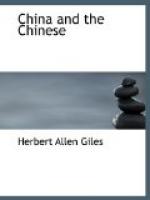“A drunken man who falls out of a cart, though he may suffer, does not die. His bones are the same as other people’s; but he meets his accident in a different way. His spirit is in a condition of security. He is not conscious of riding in the cart; neither is he conscious of falling out of it. Ideas of life, death, fear, etc., cannot penetrate his breast; and so he does not suffer from contact with objective existences. And if such security is to be got from wine, how much more is it to be got from Tao?”
The doctrine of Relativity in space and time, which Chuang Tzu deduces from Lao Tzu’s teachings, is largely introduced by the disciple.
“There is nothing under the canopy of Heaven greater than an autumn spikelet. A vast mountain is a small thing. The universe and I came into being together; and all things therein are One.
“In the light of Tao, affirmative is reconciled with negative; objective is identified with subjective. And when subjective and objective are both without their correlates, that is the very axis of Tao. And when that axis passes through the centre at which all infinities converge, positive and negative alike blend into an infinite One.”
Thus, morally speaking, we can escape from the world and self, and can reverse and look down upon the world’s judgments; while in the speculative region we get behind and beyond the contradictions of ordinary thought and speech. A perfect man is the result. He becomes, as it were, a spiritual being. As Chuang Tzu puts it:—
“Were the ocean itself scorched up, he would not feel hot. Were the Milky Way frozen hard, he would not feel cold. Were the mountains to be riven with thunder, and the great deep to be thrown up by storm, he would not tremble. In such case, he would mount upon the clouds of Heaven, and driving the sun and moon before him, would pass beyond the limits of this external world, where death and life have no more victory over man.”
We have now an all-embracing One, beyond the limits of this world, and we have man perfected and refined until he is no longer a prey to objective existences. Lao Tzu has already hinted at “the Whence, and oh, Heavens, the Whither.” He said that to emerge was life, and to return was death. Chuang Tzu makes it clear that what man emerges from is some transcendental state in the Infinite; and that to the Infinite he may ultimately return.
“How,” he asks, “do I know that love of life is not a delusion after all? How do I know that he who dreads to die is not like a child who has lost the way, and cannot find his home?
“Those who dream of the banquet wake to lamentation and sorrow. Those who dream of lamentation and sorrow wake to join the hunt. While they dream, they do not know that they dream. Some will even interpret the very dream they are dreaming; and only when they awake do they know it was a dream. By and by comes the Great Awakening, and then we find out that this life is really a great dream. Fools think they are awake now, and flatter themselves they know if they are really princes or peasants. Confucius and you are both mere dreams; and I, who say you are dreams,—I am but a dream myself.




